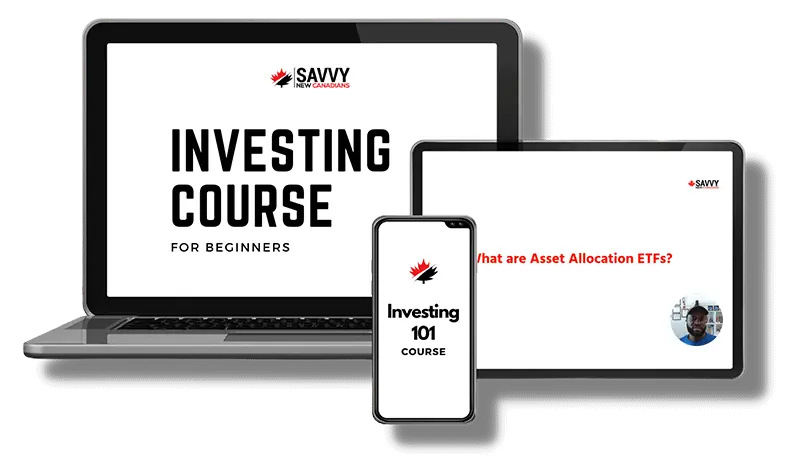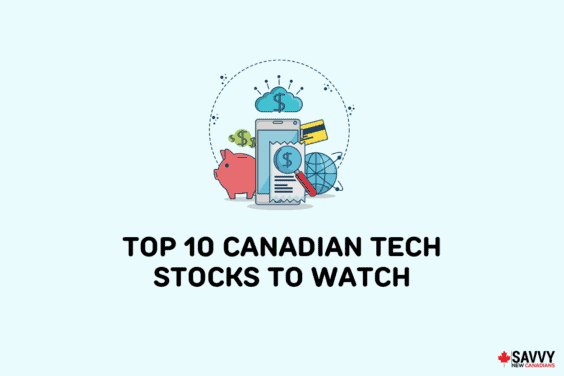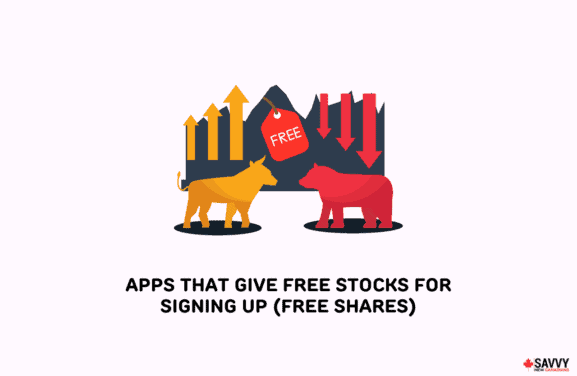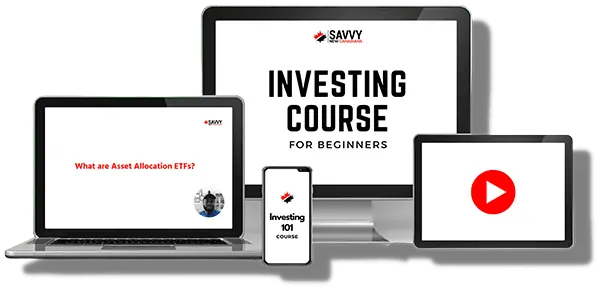The Tax-Free Savings Account (TFSA) has been well received by Canadians, with recent polls showing that more Canadians now have a TFSA (57%) compared to an RRSP (52%).
TFSAs are versatile tools in that you can use them to save or invest for practically any purpose, not only for retirement. You can also withdraw your money at any time.
What investments can you hold in a TFSA account? It’s a lot. Most investment assets in your RRSP are acceptable in a TFSA.
Read on for some of the best TFSA investment options for your tax-free savings account.
Best TFSA Investment Accounts
To start, let us clarify what the government permits you to invest in using your TFSA funds. Generally, you can use the following “qualified” investments:
- Cash, savings, and term deposits (GICs).
- Securities listed on a designated stock exchange, e.g. stocks and ETFs.
- Bonds (including federal, provincial government, and corporate bonds).
Some others, e.g. gold and silver bullion, small business corporation shares, etc., do not apply to most people.
Some types of investments are prohibited in a TFSA, and you can read about them here.
From the general TFSA investment options listed above, your choice may be determined by your:
- Investment objectives, e.g. are you investing for a long-term goal (e.g. retirement), short-term savings (e.g. emergency fund, wedding, car), or other purposes?
- Level of risk tolerance.
- Investment knowledge and confidence with self-directed investing.
- Overall asset allocation in your investment portfolio.
Traditional Low-Risk TFSA Investments
The most popular assets for TFSA accounts are savings accounts and GICs.
Best TFSA Savings Accounts in Canada
Savings accounts are an ideal option if you will likely need your funds within a year or so. Any interest income you earn remains 100% tax-free.
For example, if you are saving towards a home downpayment or your wedding, you want some assurance that your funds are going to be accessible on short notice.
If your money is invested in the stock markets, you are exposed to the ups and downs that may mean significant losses (or gains) when you need the money.
Your best bet is a high-interest savings account that pays you returns in excess of the inflation rate. Unfortunately, most big banks fail in this area.
Our #1 choice for TFSA savings at Savvy New Canadians is EQ Bank. It offers one of the best interest rates for TFSAs in Canada.
For a list of other TFSA savings account options, see our list of the best TFSA savings accounts in Canada.
Best TFSA GICs in Canada
A Guaranteed Investment Certificate (GIC) may be ideal if you want to save for a short to medium-term (1-5 years) in a very low-risk asset.
GICs can be laddered to provide income at specific times, and they generally offer rates higher than a savings account for the same duration.
Your principal is guaranteed, so you don’t have to worry about going belly-up. Typically, the longer the term (i.e. the number of months or years), the higher the interest rate earned.
Note that you may be penalized for cashing out your GIC before its term expires if it’s a non-cashable GIC. Earnings on a GIC are also not taxed in a TFSA account.
Compare the best GIC rates in Canada.
Self-Directed TFSA Accounts
Self-directed TFSA investing can save you money in lower management fees and higher returns if you know what you are doing. With a self-directed TFSA account, you determine what assets you want to hold and in what proportions.
Using a discount brokerage account, you can buy and sell stocks, ETFs, mutual funds, and other assets easily from the comfort of your home on most devices.
Managing your own portfolio without the assistance of “professionals” can be challenging. You will need to:
- Understand asset allocation and the dynamics of risk and return.
- Be comfortable with portfolio rebalancing.
- Be aware of fees, as trading fees and commissions add up if you are frequently trading. More on this later.
Using ETFs in a TFSA
Exchange-Traded Funds (ETFs) are similar to mutual funds; however, they are usually cheaper and trade like common stocks on an exchange. ETFs offer a great way to diversify your investments since a single ETF may hold thousands of stocks or bonds.
Like index funds, an ETF can be designed to mirror the performance of an entire index, market, or industry sector.
The increasing popularity of ETFs vs. mutual funds is mostly due to their lower MER. The average equity mutual fund costs more than 2%, while you could easily find an ETF that costs less than 0.25% and provides similar coverage or even better historical returns.
The fact is that paying more in fees does not necessarily translate into better returns. The opposite is often true.
You can easily purchase ETFs using a discount brokerage, e.g. Questrade ($50 in free trades and free ETF purchases) or Qtrade (Up to $150 bonus).
ETF providers like Vanguard, iShares and BMO have taken ETFs a step further, so you don’t even need to worry about rebalancing with their introduction of All-in-One ETF Portfolios.
Vanguard’s all-in-one ETFs include:
- Vanguard All-Equity ETF Portfolio (VEQT)
- Vanguard Growth ETF Portfolio (VGRO)
- Vanguard Balanced ETF Portfolio (VBAL)
- Vanguard Conservative ETF Portfolio (VCNS), and
- Vanguard Conservative Income ETF Portfolio (VCIP)
Investing TFSA in Stocks
Trading stocks using a discount brokerage is easy. Heck, some brokers like Wealthsimple Trade even allow you to buy and sell stocks for free (i.e. no trading commissions) using your TFSA account.
Investing in stocks is a risky business, and your returns are not guaranteed. However, historical data shows us that you could enjoy significantly higher long-term returns. Between 1970 and 2015, the Canadian stock markets provided an average annual return of 10.4%.
Four things you should note if you decide to invest in individual stocks for your TFSA:
- Capital losses cannot be used to offset capital gains in a TFSA account.
- Holding an adequately diversified portfolio is impossible if you are invested in a handful of stocks. A preferred alternative is to use diversified equity ETFs.
- Foreign dividend income provided by blue-chip stocks is subject to a withholding tax (15% for U.S. dividend stocks) when held inside a TFSA.
- Day-trading stocks, ETFs, or anything for that matter in your TFSA will get you in trouble.
TFSA Mutual Funds
Mutual funds have traditionally been a very popular way to invest – whether it be in an RRSP, TFSA, or non-registered investment account. They are easy to use. Simply walk into your bank, answer some questions, and they set you up with some mutual funds.
The problem with this approach is that you may end up paying your fund manager a lot of money in fees – 2% or more per year the last time I checked.
I generally don’t recommend investing in expensive mutual funds if you can avoid them since there are now better options available.
Index funds are similar to mutual funds. However, they are passively managed and are cheaper. Some of the popular index funds available in Canada are:
- TD e-Series Funds
- Tangerine Investment Funds (one-fund solution)
- RBC Index Funds
- Scotiabank Index Funds

Robo-Advisor TFSA Accounts in Canada
Online wealth managers, aka Robo-advisors, offer TFSA accounts using low-cost ETFs. Robo-advisors are an excellent option because they offer investors access to professional money management at a lower fee compared to the traditional wealth management services available through bigger financial institutions.
Also, you don’t need much investment know-how to invest with them.
Robo-advisors ask you a series of questions to determine your risk tolerance and investment objectives and then match you up with a portfolio that meets your needs. Unlike in a self-directed TFSA, they help you with rebalancing your portfolio when required.
On the fees side of things, robo-advisor fees are much lower, at an average of 0.75% (including the management fee and ETF MERs).
Questwealth is Canada’s lowest-fee robo-advisor, and you can learn more about what it offers in this review.
Wealthsimple Invest is one of Canada’s most popular robo-advisors. Learn more about it in this review.
You can compare the services and offerings provided by the various robo-advisors in Canada. If you are interested in how their fees compare, you can read this robo-advisor fee post.
Benefits of a Tax-Free Savings Account
The main benefits of a TFSA (Tax-Free Savings Account) include:
- Tax-Free Growth: Any income earned within a TFSA account, such as interest, dividends, or capital gains, is tax-free. This means that you don’t pay taxes on the growth of your investments, which can result in higher investment returns over time.
- Tax-Free Withdrawals: Unlike an RRSP, withdrawals from a TFSA account are tax-free. This makes TFSAs a good option for short-term savings goals or for individuals who anticipate being in a higher tax bracket in the future.
- Flexibility: TFSAs are flexible in terms of contribution and withdrawal options. There are no restrictions on how you use the money in your TFSA, and you can withdraw funds at any time without penalty. Additionally, unused contribution room can be carried forward indefinitely, and the contribution limit is indexed to inflation and adjusted annually.
- No Age Limit: Unlike an RRSP, there is no age limit for contributing to a TFSA. This means that you can continue to contribute to your TFSA account throughout your lifetime, regardless of whether you are working or retired.
- No Impact on Government Benefits: Because withdrawals from a TFSA are tax-free, they do not count as income and do not impact government benefits such as Old Age Security (OAS) or the Guaranteed Income Supplement (GIS).
Downsides of TFSAs
Some limits of the TFSA include the following:
- Over-Contribution Penalty: If you exceed your contribution limit, you may be subject to a penalty tax of 1% per month on the excess amount.
- Not Tax-Deductible: Unlike RRSPs, contributions to a TFSA are not tax-deductible. This means that high-income earners may not benefit as much from a TFSA as they would from an RRSP, which can offer significant tax savings.
- Short-Term Mentality: Because withdrawals from a TFSA are tax-free, some individuals may use their TFSA as a short-term savings account rather than a long-term investment vehicle. This can result in a failure to maximize the potential tax-free growth of the account over time.
Conclusion
To recap, if you want to save money for the short term, a high-interest savings account like EQ Bank or similar is an option.
For medium to long-term investment plans, you can use a robo-advisor like Wealthsimple or Questwealth to save on fees and invest in ETFs while you sit back and watch your account grow.
If you’d rather be in the driver’s seat, you can use a discount brokerage account like Questrade or Qtrade to buy and sell investment assets in your portfolio.
TFSA Investment FAQs
Here are answers to some of the questions I’m frequently asked in relation to TFSA investments.
The TFSA contribution limit in 2024 will increase to $7,000. If you have been eligible to contribute since 2009, your total contribution room in 2024 is $95,000.
The TFSA contribution limit in 2023 is $6,500. Here is some information about TFSA contribution rules.
Yes, investments in the financial markets are exposed to various risks. However, TFSA contributors enjoy some protections, including:
– Funds in TFSA savings or term deposit accounts may be protected for up to $100,000 by the Canada Deposit Insurance Corporation (CDIC). For deposits in a credit union TFSA, you could get up to 100% protection regardless of the amount.
– Investments (stocks, mutual funds, ETFs) are protected for up to $1 million through the Canadian Insurance Protection Fund (CIPF).
Yes, you can purchase Canadian, US, and other international stocks in your TFSA account. To purchase individual stocks, you will need a discount brokerage account such as Questrade or Wealthsimple Trade. Currency exchange fees may apply.
Interest income, dividends, and capital gains earned in a TFSA are tax-free. With that said, taxes may be due if you invest in foreign stocks that pay dividends (effectively a 15% withholding tax) or contribute to a TFSA while you are deemed a non-resident of Canada (1% penalty tax per month). Excess TFSA contributions are subject to a 1% penalty every month until they are withdrawn.
Any time. When you withdraw money from your TFSA, you can re-contribute it in future years.
After death, the TFSA goes to either a named successor holder, beneficiary, or the estate of the deceased contributor.
A Successor Holder (e.g. a spouse) can simply take over the TFSA and transfer it to their own. They get the money tax-free. A beneficiary (spouse, child, or anybody really) can contribute the value of the TFSA to their own account. The estate receives the proceeds if no successor holder or beneficiary is named. Read more about TFSA disposition after death.
$1. Seriously. A robo-advisor like Questwealth allows you to open a TFSA account and start investing with as little as $1,000.
The TFSA account is what you make it. You can use it to invest for retirement or turn it into your savings piggy bank (not recommended). For investing purposes, you can purchase stocks, ETFs, mutual funds, GICs, and many other assets.
Stocks, ETFs, mutual funds, savings, GICs, bonds, and pretty much any other investment you can hold in an RRSP.
You can open multiple TFSA accounts in different financial institutions and contribute to them as long as you have contribution room.
You can check your CRA My Account to find out (it may not be up-to-date) or call CRA at 1-800-267-6999.
TFSA contributions are from after-tax dollars. No, you can’t deduct your TFSA contributions from the taxable income on your tax return.
Here is a detailed TFSA vs. RRSP guide that highlights their similarities and differences.








Really great information on TFSAs! The best use of one’s TFSA really depends on their goals and overall financial picture, doesn’t it? For one person who needs the money next year, a GIC might be best, but for retirement and long-term goals, equities (in the form of index ETFs) are the way to go. IMO, the worst thing to put into a TFSA is cash or even GICs. You’re saving the tax on what- 1 or 2%? Not much tax savings to be had there!
Your blog and content are fantastic!
@Steve: Good point. Personally, I stay clear of savings/GICs… Just not worth my while given the ridiculous rates being offered.
Thanks for your feedback!
Hi Enoch ,
Can I open a TFSA for goals like downpayment, retirement with Wealthsimple for example, then 2 HISA -in GIC and cash (for goals such as emergency fund, vacation et.c )with EQ for example. Will this be a good plan ? A newbie here
@Nikky: For short-term savings goals e.g. downpayment, emergency fund, and vacation, etc., you want to use GIC or cash savings that are somewhat resilient to market forces even though you may not earn a whole lot of interest income. For retirement savings, a TFSA/RRSP with Wealthsimple works well. Make sure to complete your risk profile with long-term investing in mind. Depending on your time horizon before retirement, a higher risk-return approach may be appropriate.
Bonjour, j’ai une question, je suis expatrié vivant au canada actuellemnt, je ne suis pas sur de finir ma retraite en france (j’ai 27 ans). Si je veux investir sur Interactiv Brokers dans des actions et Fnb americaines je dois choisir quand meme un REER pour eviter les 15% d’impots ? merci de votre reponse
@Anthony: You will need to pay taxes when you make withdrawals from an RRSP – whether it is in retirement or prior to retirement. As for the TFSA, your investments grow tax-free for life, however, dividends paid by U.S. stocks are subject to a 15% withholding tax (you can avoid this with an RRSP).
Thank you!
hello, i m confused, please help. i use tangerine as my bank. it offers tfsa savings account but you cannot do anything with your money except just treat it as cash like in any other savings account. when i tried to invest my money from tfsa savings into eft, i couldnt. then i learned that i need to open a tfsa investment fund account so that i can buy stocks, gics, funds, whatever i want to invest in. now i dont understand whats the benefit of regular tfsa savings account? i dont what setup other banks offer. should i close my tfsa savings account and just use my tfsa investment fund account?
@Farhaan:
A TFSA savings account is similar to a general savings account and it pays you interest on your money while keeping the income you earn tax-free.
If you want to invest your TFSA in stocks or ETFs, you can open a TFSA investment account such as the ones offered by the Tangerine Investment Funds; you can also use a discount broker account such as Wealthsimple Trade, Questrade, Qtrade, etc.
If you are not comfortable with picking your own stocks or ETFs, you can use a robo-advisor account (e.g. Wealthsimple Invest or Questwealth). In this case the robo-advisor manages your account on your behalf and invests your TFSA funds in ETFs (stocks and bonds).
For GICs, you can open a TFSA GIC account and use it to purchase GICs with varying terms (length of time to maturity).
i want to start a niece in investing, she turns 18 in November. i want to open a TFSA account for her and contribute $5000 and advise her to invest half of in in Canadian bank ETF.
What is the best way to do that she has a TD bank account now.
thanks
@Delmor: She can open a brokerage account at TD or any other big bank or go with one from the likes of Wealthsimple or Questrade. The big bank brokerages and independent discount brokers have their pros and cons. More info below:
https://www.savvynewcanadians.com/best-online-stock-brokers-canada/
https://www.savvynewcanadians.com/best-investment-accounts-canada/
Many thanks for clarification of several points.
Our daughter lives and works in the US. She has dual citizenship. We have helped her thru the years with cash gifts from time to time. We are well into our senior years and she will be our beneficiary. I am not sure what the US rules are concerning this. Is there any way to reduce the taxation from both countries? Would it be better to gift some funds in advance of our demise? Just wondering what our options are.
Looking forward to your reply. D.
@Diane: You can designate your daughter as a beneficiary for your TFSA, and she will receive the funds tax-free. For RRSP assets, a non-qualified beneficiary (i.e. non-financially dependent child) can also receive funds, but the value will be reported in your final tax return and taxed. There are certainly some benefits to gifting funds while you are still alive. That said, I am not very familiar with the Canada/US tax dynamic, other than that some tax equalization does occur.